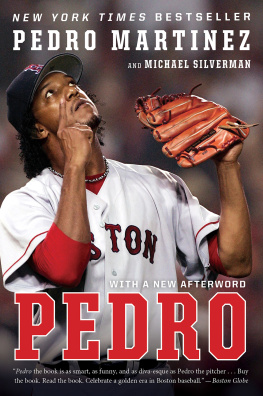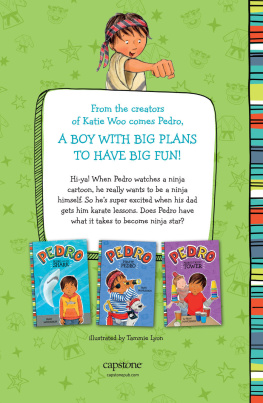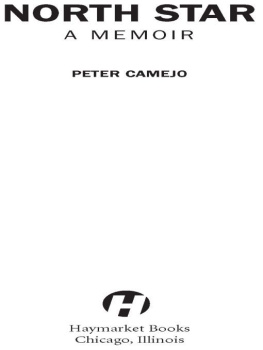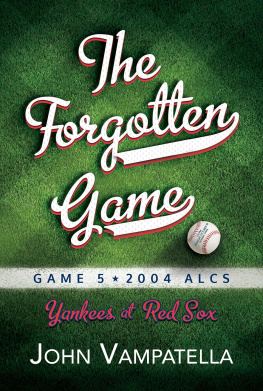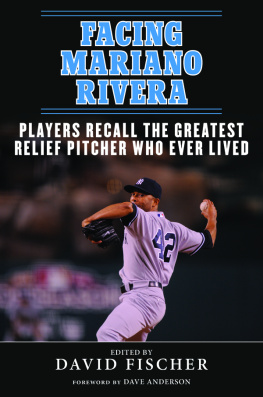First Mariner Books edition 2016
Copyright 2015 by Pedro Martinez
All rights reserved
For information about permission to reproduce selections from this book, write to or to Permissions, Houghton Mifflin Harcourt Publishing Company, 3 Park Avenue, 19th Floor, New York, New York 10016.
www.hmhco.com
Library of Congress Cataloging-in-Publication Data is available.
ISBN 978-0-544-27933-9 (hardcover) ISBN 978-0-544-70531-9 (pbk.)
e ISBN 978-0-544-27923-0
v2.0516
Cover design by Brian Moore
Cover photograph AP Photo/Kevork Djansezian
I dedicate this book to my dad, who passed a few years ago, and to my mom, who still lives, and to Ramon, for being a father figure in my life. Thank you for the foundation you gave to me and my brothers and sisters, for your dedication, hard work, unconditional love, and support. Because of you, I was able to withstand every obstacle and adversity.
P EDRO M ARTINEZ
Introduction
EVERYONE LAUGHED .
I wasnt trying to be funny.
I was in no mood.
An hour after our Game 2 loss in the 2004 American League Championship Series, I had been led into the Yankee Stadium media dining room, a cramped and stuffy, low-ceilinged, ill-suited space used for postseason press conferences. I had just showered and my slicked-back jheri curls were still wet, dampening my shirt. I settled slowly into my chair behind a table with a single microphone on it, a red-white-and-blue ALCS banner serving as my backdrop.
I fielded a couple of game-specific questions about my start.
I waited patiently for the question.
We were down 02 in the series, and the Yankees and their fans were in high spirits. They had us on our heels. It didnt help that just a few weeks earlier at Fenway Park I had been in the hot seat in a similar postgame press conference after a similar loss in one of my starts.
Thats when I had blurted out that the Yankees are my daddy.
I should have known better.
My quote filled a convoy of long-haul trailers with chum, enough to keep a pool of media sharks content for the weeks leading up to this postseason game, this time in enemy territory. The instant I walked out of the visitors dugout to warm up, a cascade of rhythmic Whos your dad-dy? chants rolled down from the rafters. The jeers did not let up until I was out of the game. It was loudimpressively loud.
Now I had to endure the obligatory press conference. Somewhere from the crescent of newspaper and radio reporters, photographers, and TV cameramen who surrounded me, one reporter asked the question, phrasing it in my least favorite way: Talk about...
Talk about how the crowd affected you, the Whos your daddy? chant that was really going, screaming your nametalk about that, please?
I threw them my changeup.
You know what, it actually made me feel really, really good, I said, which sparked the ripple of laughter that spread around the room.
I took a quick, unsmiling survey of the faces around me. To me, the laughter sounded nervous.
And ignorant.
A familiar ignorance.
I dont know why you guys laugh, because I havent even answered the question, I said, pausing a beat until my scolding brought the tittering to a halt. I actually realized that I was somebody important, because I caught the attention of 60,000 people, plus you guys, plus the whole world watching a guy that if you reverse the time back 15 years ago, I was sitting under a mango tree without 50 cents to actually pay for a bus. And today I was the center of attention of the whole city of New York. I thank God for that.
I dont like to brag about myself, I dont like to talk about myself, but they did make me feel important. Ive seen a lot of teams pass by and play against this team, the Yankees, and maybe because Im with the Red Sox, but I feel so thankful that I got their attention and they got my attention.
From where Im sitting today, on a white wicker rocking chair on a flagstone patio across the path from my cottage at la finca, I can look up the gentle rise of the hill and see the tips of the shiny, dark green leaves from that same mango tree.
Its branches hang over a scuffed gray-and-white slab of concrete, a 15-by-20-foot rectangle that is the foundation, all thats left, of the shack where I grew up with my two sisters, three brothers, and parents. A sleeping area divided by a sheet hung from the ceiling, a couch and small kitchen on the other side of the sheetthat was it. One room, four walls, a front door, and a roof covered with corrugated zinc sheets. Outside the front door was a ditch-lined dirt street, no different from every other dirt street in Manoguayabo, a village that sprawls over the steep hills eight miles due west of Santo Domingo, the capital of the Dominican Republic.
Step out the front door of the shack, take three more steps to your right, and there stands the mango tree.
Before my father was born in Manoguayabo in 1929, and before The House That Ruth Built went up in the Bronx in 1923, that mango tree was there. The infamous 1930 Dominican Republic hurricane, San Zenon, one of the hurricanes that too regularly spin furiously across our island of Hispaniola, flattening shacks and small buildings, flooding villages and towns, and ripping up sugar cane fields and orange groves, toppled our mango tree.
Its deep roots held, though.
The tree did not die, but its main trunk grew parallel to the ground for a few years before it began to bend upward and resume its skyward reach. The setback created a crook in the trunk, a perfect-sized bench for a small boy like me to climb onto with a book or just to lie back and watch shards of blue sky and puffy white clouds flicker in and out of view between the rustling leaves. I would climb high some days, searching for a ripe mango, or higher still to break off a branch to use for a baseball bat or just to whip around.
For me, to travel in time and space from a pitchers mound, even the one located in baseballs most sacred and historic diamond, back to a single tree in my homeland was more than a comfortable and familiar routine.
It was a survival skill.
Ever since I began playing baseball professionally with the Dodgers as a 16-year-old in their Dominican academy in Campo Las Palmas, and as I rose quickly through the Dodgers minor league system and then on to big-league rosters in Los Angeles, Montreal, Boston, New York, and Philadelphia, I stood on the mound with the instincts of a survivor.
I had the essentials, beginning with the heart of a lion.
Behind every pitch lay the determination and will to win: to kill rather than be killed.
In between pitches, my mind, my wandering mind, would race everywhere.
Early on, when I was in the minor leagues and measuring up the opposing batter, I would conjure up a scene straight out of the most gruesome Hollywood blood-and-gore slasher flick: my mother, strapped tightly by ropes to a chair, her mouth gagged, her eyes clenched shut, too terrified to look down at the tip of a knife held to her throat by the leader of a gang of kidnappers.
Your move, Pedro.
Her life, in my hands.
If I could not get this batter outand the next one, then the one after him, and then the leadoff batter in my next start five days laterthen the kidnappers would carry out their threat and my mothers throat would be slashed.
Later, after I had proven I could get batters out as well as anyone else in the game, I switched to subtler forms of motivation.
Skeptics who doubted that my slender body could withstand the rigors of starting; coaches who belittled, berated, or fed off of me like leeches; jealous teammates who wanted to fight me; batters who charged me because they mistook my need to pitch inside for a desire to knock their heads off; a baseball establishment that tried to slow my entry into the rarefied air as one of the elite pitchers of all time; rude media members who probed where they shouldnt have and harped on the negativemy God, baseball was a noisy, teeming jungle.
Next page
